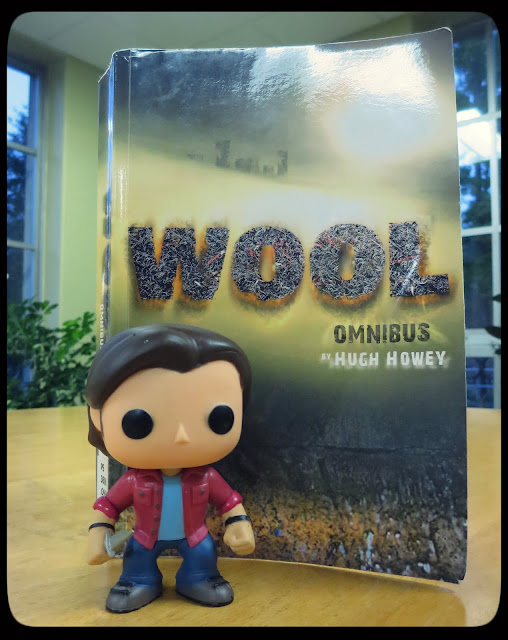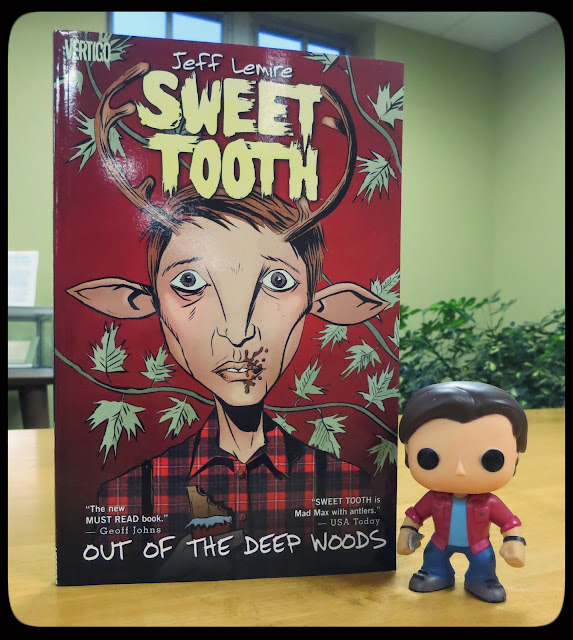I Feel Fine: Post-Apocalyptic October
For October, we're looking at Post-Apocalyptic stories! While the basic premise of the genre is pretty clear - civilization has ended; now what? - there are a few defining features that may have slipped your notice. Typically, the end of the world (or, at least, mankind's dominance of it) has occurred realistically: disease, war, famine, global natural disaster, and the like. More often than not, we did it to ourselves, and possibly the rest of Earth's inhabitants, too. There's nothing left to do but pick up the pieces.
But the genre does insist that we look at a few questions along the way. What could we have done to prevent this? A very important question, as we're in a great position now to actually prevent whatever disaster the author portrays, and one that usually more particularly concerns itself with the ethics of modern technology. How can we fix this? Most often, what's left after the apocalypse is a failing and oppressive system - even if that system has worked for longer than the characters can remember - which needs to be overthrown. What does this say about human nature? The mirror held up to mankind by post-apocalyptic works often shows an interesting duality - the horrors we are capable of, both by the destruction of civilization and the power-grabbing that creates cruel systems, and our potential greatness, as the protagonists show in bringing new hope to a shattered world. Together, these questions show the heart of the post-apocalyptic genre: What are we doing now that is leading to our own destruction - and how do we stop it? While the premise is depressing, post-apocalyptic works are, essentially, hopeful.
October's Main Read is brought to us by Sam, who has prevented more than a few apocalypses in his time - although, to be fair, he and his brother prompted some of those, as well. Check it out:
In the Wool Omnibus, Hugh Howey introduces us to the world of the silo - an underground civilization protecting the remnants of humanity. The world outside, visible on screens fed by ancient sensors, appears barren and deadly - and the most sacred rule of the silo is that no one thinks about going outside. If you do, you get exactly what you wish for. Three years ago, Holston's wife was sent out to Clean - and now Holston, caught up in the secret knowledge she left behind, wants nothing more than to follow her.
The story is as twisty as the silo's stairs, and explores the lengths people will go to in order to survive - both extraordinarily courageous and frighteningly vile. The apocalypse that created this world happened so long ago that people no longer remember exactly what it was - only that it has made existence outside the silo impossible. Unlike many post-apocalyptic novels with similar premises, the main characters are not valient teens - they're adults, with aches and worries and responsibilities.
Highly recommended for those who enjoyed YA dystopian novels - but want something a little more substantive to read next.
This month's Quick Read, also brought to you by Sam, is a the first of a finished comic book series! (The whole series is great, too.)
In Jeff Lemire's Sweet Tooth: Out of the Deep Woods, we meet Gus - a kid who, for as long as he can remember, has lived in the woods with his father. Civilization has fallen suddenly and recently, ravaged by a plague that has killed billions and left behind children with animalistic features, and Gus and his father are hiding. Gus has deer-like features and a very sweet tooth. When hunters drive him from his home, Gus is rescued by a vicious man named Jepperd, who has his own dark history.
Although the main character is young, this is definitely an adult comic book series, exploring the meaning of family, as well as how grief and fear can drive us to do great evil. Recommended for comic book fans who like post-apocalyptic story lines but would appreciate knowing there's an end to the series.
Can't get enough of the end of the world? Let me know if you need more post-apocalyptic reading recommendations, and I'll ask Sam - after checking he isn't possessed by Lucifer again. (They have very different reading tastes.)
Happy readings, and we'll see you next for more recommendations from the Readers Advisory Committee!
But the genre does insist that we look at a few questions along the way. What could we have done to prevent this? A very important question, as we're in a great position now to actually prevent whatever disaster the author portrays, and one that usually more particularly concerns itself with the ethics of modern technology. How can we fix this? Most often, what's left after the apocalypse is a failing and oppressive system - even if that system has worked for longer than the characters can remember - which needs to be overthrown. What does this say about human nature? The mirror held up to mankind by post-apocalyptic works often shows an interesting duality - the horrors we are capable of, both by the destruction of civilization and the power-grabbing that creates cruel systems, and our potential greatness, as the protagonists show in bringing new hope to a shattered world. Together, these questions show the heart of the post-apocalyptic genre: What are we doing now that is leading to our own destruction - and how do we stop it? While the premise is depressing, post-apocalyptic works are, essentially, hopeful.
October's Main Read is brought to us by Sam, who has prevented more than a few apocalypses in his time - although, to be fair, he and his brother prompted some of those, as well. Check it out:
Wool
The children were playing while Holston climbed to his death; he could hear them squealing as only happy children do. While they thundered frantically above, Holston took his time, each step methodical and ponderous, as he wound his way around and around the spiral staircase, old boots ringing out on metal treads.
In the Wool Omnibus, Hugh Howey introduces us to the world of the silo - an underground civilization protecting the remnants of humanity. The world outside, visible on screens fed by ancient sensors, appears barren and deadly - and the most sacred rule of the silo is that no one thinks about going outside. If you do, you get exactly what you wish for. Three years ago, Holston's wife was sent out to Clean - and now Holston, caught up in the secret knowledge she left behind, wants nothing more than to follow her.
The story is as twisty as the silo's stairs, and explores the lengths people will go to in order to survive - both extraordinarily courageous and frighteningly vile. The apocalypse that created this world happened so long ago that people no longer remember exactly what it was - only that it has made existence outside the silo impossible. Unlike many post-apocalyptic novels with similar premises, the main characters are not valient teens - they're adults, with aches and worries and responsibilities.
Highly recommended for those who enjoyed YA dystopian novels - but want something a little more substantive to read next.
_________________________________________________________________________________
This month's Quick Read, also brought to you by Sam, is a the first of a finished comic book series! (The whole series is great, too.)
Sweet Tooth
I seen his face again when I was sleeping.
The big man... He's just looking down at me with them cold eyes.
And I run. I run faster than I even thought I could, 'cause behind me is fire and hell and bad stuff.
And he's back there too, chasing me, getting closer and closer no matter how fast I go...
In Jeff Lemire's Sweet Tooth: Out of the Deep Woods, we meet Gus - a kid who, for as long as he can remember, has lived in the woods with his father. Civilization has fallen suddenly and recently, ravaged by a plague that has killed billions and left behind children with animalistic features, and Gus and his father are hiding. Gus has deer-like features and a very sweet tooth. When hunters drive him from his home, Gus is rescued by a vicious man named Jepperd, who has his own dark history.
Although the main character is young, this is definitely an adult comic book series, exploring the meaning of family, as well as how grief and fear can drive us to do great evil. Recommended for comic book fans who like post-apocalyptic story lines but would appreciate knowing there's an end to the series.
Can't get enough of the end of the world? Let me know if you need more post-apocalyptic reading recommendations, and I'll ask Sam - after checking he isn't possessed by Lucifer again. (They have very different reading tastes.)
Happy readings, and we'll see you next for more recommendations from the Readers Advisory Committee!





Comments
Post a Comment